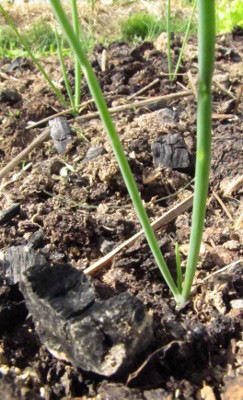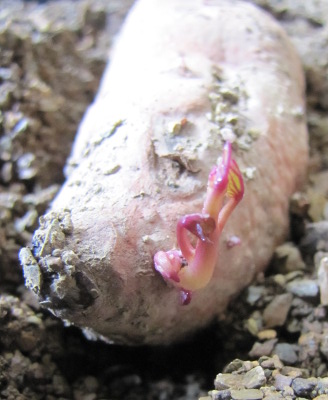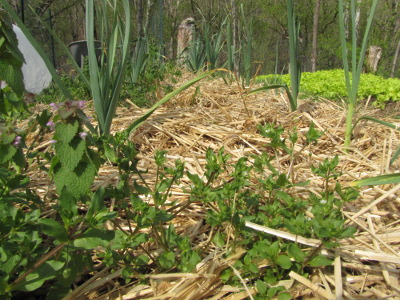
Garden experiments: Biochar, sweet potato slips, and mulch
 I've got so many tidbits to
share about garden experiments that I'm going to sum them up in one
post. (Actually, I had too many for one post, so another will be
coming along one day soon.)
I've got so many tidbits to
share about garden experiments that I'm going to sum them up in one
post. (Actually, I had too many for one post, so another will be
coming along one day soon.)
- Biochar --- I applied urine-soaked biochar to half of a few beds in February and am starting to see the results. Two of the beds house lettuce and poppies, and I can't really see a difference between the biochar half and the other half. On the other hand, the onion test bed has a striking difference in both germination and height --- 21 seedlings averaged 10.8 cm tall for the biochar half and 16 seedlings averaged 8.4 cm tall for the control half. The results aren't statistically significant (yes, I geekily measured every seedling and ran a t-test), but the the trend is interesting. I wonder if the better germination/survival of the biochar bed could be because the dark charcoal heated up the soil in that critical early spring germination period?
 Sweet potato slips ---
This year, I decided to start
our sweet potatoes in gravel instead of water in hopes of rotting
fewer tubers and getting slips sooner. Eight days after putting
the potatoes in, I already see the first shoot! The jury's still
out on whether we'll get more slips sooner than with our previous
method, but I'm thrilled to see such early growth.
Sweet potato slips ---
This year, I decided to start
our sweet potatoes in gravel instead of water in hopes of rotting
fewer tubers and getting slips sooner. Eight days after putting
the potatoes in, I already see the first shoot! The jury's still
out on whether we'll get more slips sooner than with our previous
method, but I'm thrilled to see such early growth.- Mulching over winter weeds
--- In an effort to keep the weeds around the garlic in check without
freezing my fingers in cold March soil, I
topped the weeds off with a thick layer of straw. The results
were so-so --- the chickweed and purple dead nettle still pushed up
through the straw, but the mulch slowed it down
 enough that neither went to seed
before I got a chance to clean up the beds this week. It was
simpler than I thought it would be to slip my fingers under the mulch
and root out the weeds, but I did lose a considerable amount of straw
in the process since it clung to the plants being pulled out. If
I'm desperate, I'll over-mulch again, but a more efficient use of my
straw would have been to follow up in late fall and mulched before
weeds arrived.
enough that neither went to seed
before I got a chance to clean up the beds this week. It was
simpler than I thought it would be to slip my fingers under the mulch
and root out the weeds, but I did lose a considerable amount of straw
in the process since it clung to the plants being pulled out. If
I'm desperate, I'll over-mulch again, but a more efficient use of my
straw would have been to follow up in late fall and mulched before
weeds arrived.
Our chicken waterer is an experiment that was a
great success --- we never have to deal with poopy water and I only top
off the flock's bucket once a month.
Want more in-depth information? Browse through our books.
Or explore more posts by date or by subject.
About us: Anna Hess and Mark Hamilton spent over a decade living self-sufficiently in the mountains of Virginia before moving north to start over from scratch in the foothills of Ohio. They've experimented with permaculture, no-till gardening, trailersteading, home-based microbusinesses and much more, writing about their adventures in both blogs and books.
Want to be notified when new comments are posted on this page? Click on the RSS button after you add a comment to subscribe to the comment feed, or simply check the box beside "email replies to me" while writing your comment.

These tips and tricks will come in handy...
One very interesting book losely related to Homesteading and making it of the grid, though slightly more radical, is the 'Handbook of Traditional living'. http://www.arktos.com/raido-a-handbook-of-traditional-living.html
The same place also sells a few real nuggests (like the Self-sufficency handbook and the Ecotopia-books): http://www.arktos.com/books/environment.html
I was snagged by your mention of geekiness. Do you keep something like a lab notebook for all of your work, or do you use the blog to organize and keep track of things? If you ran a t-test I assume you must keep a book, but just wondering.
I had this idea that keeping a blog would be a good excuse not to write things down (with a two-year old, anything made of paper is hard to protect and all writing instruments eventually disappear), but now I hardly have any records of what I've been doing because it turns out I don't like using my blog for keeping technical notes. I know you've shown your lists on here, but have you ever posted your research?
If not, I'd love to know more about how you manage it all-- like what kind of notebooks, formats, etc. I think I am compulsive about organization, but not very creative when it comes to methods.
This is a question after my own heart. I do use the blog as my lab notebook a lot of the time, but I'm also aware that endless lists or numbers turn readers off, so I do a bit on paper and on spreadsheets too. My spreadsheets include:
I do use the blog as my lab notebook a lot of the time, but I'm also aware that endless lists or numbers turn readers off, so I do a bit on paper and on spreadsheets too. My spreadsheets include:
Gardening --- what I plan to plant and what I actually plant, including where the seeds come from, which bed they go into, what I add to the soil, etc. Trees, Vines, and Bushes --- what I plant, where they came from, etc. Worms --- How many pounds of food scraps we pick up per week and how many of those go in the worm bin Biochar --- Which beds I treated with biochar and what else I did to them *Mushrooms --- Before we changed over to rafts and totems, I listed when I soaked each log and if it fruited. I also list when and with what I inoculate
Then there are my paper notebooks. I keep one notebook going at a time that is simply a notebook. I jot down anything that catches my fancy, keep notes on books I'm reading, etc. When I run out of space in that notebook, I go through it and rip out any pages that have since been summed up in the blog or in my spreadsheets. There are usually only about ten pages left, so I leave that on the shelf until I go through the next notebook, at which point I rip out yet more pages that have since been summed up elsewhere. I've found that plain old notebooks don't help me much if I don't sum that information up in something more searchable.
Finally, I have a binder of pages from my paper notebooks that are referred to often. This includes various garden maps, soil test results, data on the bees (could be in a spreadsheet, but for some reason it's not), information on how long I have to leave the sprinklers on in each quadrant to get an inch of water, yearly goals, my freezer map, etc.
I highly recommend keeping good notes. At the time, it can be a bit of a pain to come in and rinse off your hands and put pen to paper after a long day in the garden, but it's very much worth it. I talk to great gardeners all the time who don't know what that awesome apple tree is in their yard (or what that terrible one is), who wish they could remember which type of lettuce they planted so that they can repeat it. Every year, we tweak our own garden to highlight the crops that did well in the past and replace the ones that failed, and every year our garden gets easier to handle and gives us more delicious food.
Your last paragraph is exactly why I want to get more organized.
I like the idea of summarizing notebook info. I do keep a notebook for daily thoughts and observations. It's a nice, sturdy art sketchbook and I use it for everything. My only problem is that I rarely review it so all of those excellent ideas that I once had are lost to me. That's something I should work on.
I also love the idea of the reference binder. I have been thinking recently that I should get some of my important computer files printed, protected and bound for quick reference. It would make things a lot easier because I'm much more likely to look into a book than scour through digital files.
Thank you for sharing the details! I suppose I'll just have to keep practicing to see what works for me. It's hard to know at this time what kind of information will be important to me several years down the road, and how I can make it quickly accessible, so I really appreciate hearing your experience.
If you made an ebook about good farmstead record keeping and/or experimental design, I'd totally buy it.